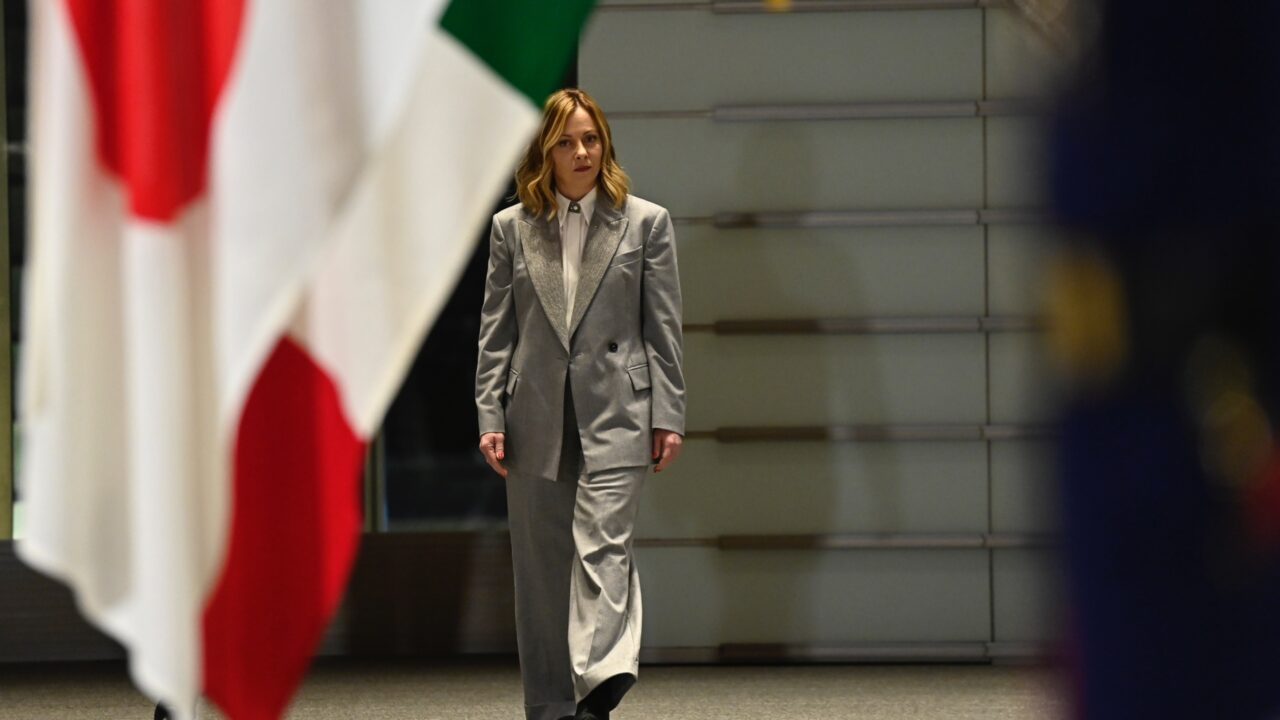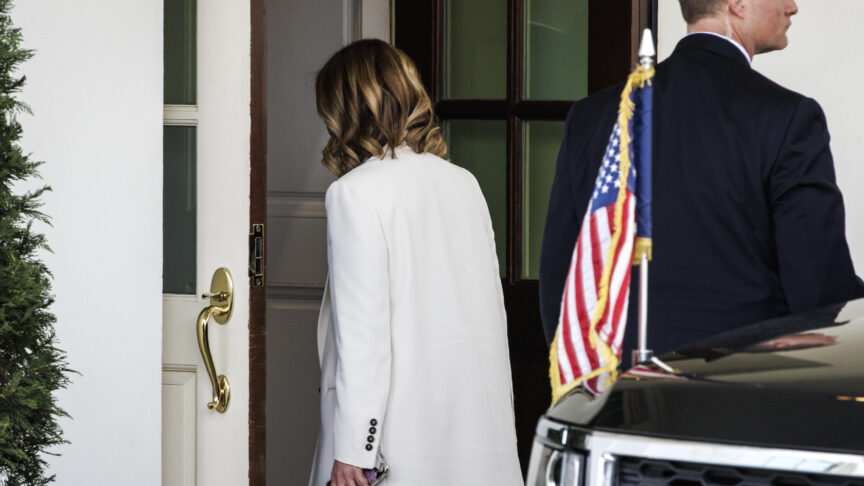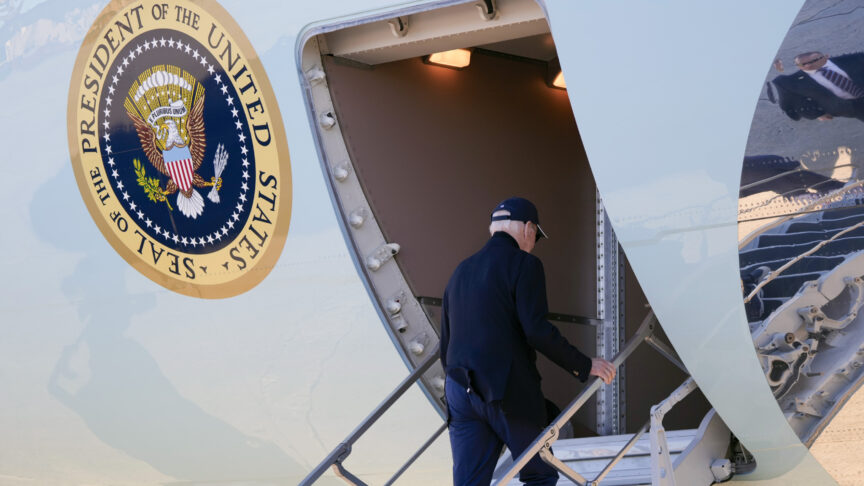Meloni’s multilateral mountain: The challenges facing Italy’s G7 presidency
Italian prime minister Giorgia Meloni has repeatedly surprised her European counterparts with her alignment with the Western community. But as Italy begins its G7 presidency, she faces the daunting task of maintaining this unity amid rising tensions and challenges
This week Italian prime minister Giorgia Meloni travelled to Tokyo to formally take over the G7 presidency from Japan. During their meeting, Meloni and Japanese prime minister Fumio Kishida confirmed that they would cooperate closely to ensure a successful G7 summit in June. But with a multitude of approaching tests, maintaining this sense of unity and cooperation among the G7 allies will be Meloni’s biggest challenge.
The summit in June will likely focus on the G7 responses to the ongoing conflicts in Ukraine and the Middle East, as well as policies towards Africa and migration, and multilateral cooperation on AI. While Western support for Ukraine has generally been strong for the last two years since Russia’s full-scale invasion, over the last couple of months cracks have emerged, with the European Union struggling to agree on military aid and the US Congress still paralysed over it. Meloni’s commitment to supporting Ukraine is firm: her defence minister Guido Crosetto has emphasised the importance of European and international unity on the issue, saying that allowing it to falter would be a strategic and political mistake that would call the West’s strategy into question.
Meanwhile, divisions over the Israel-Gaza crisis are already showing their effects on the multilateral order. With different diplomatic interests in the region, G7 members have struggled to reach common positions on their responses to the conflict and support for both Palestinians and Israel. These divisions have been clear in the United Nations, with France voting in favour of a resolution calling for a humanitarian truce in the conflict on 26 October, the United States opposing it, and the other G7 members abstaining.
Some other G7 priorities are still waiting to be concretely shaped. Africa and migration will feature heavily, in part because of their centrality to Meloni’s national agenda. Her efforts on Africa are unprecedented in Italian foreign policy and the government has hailed its Mattei plan, which was converted into law at the beginning of January, as the main strategy to solve both the issue of Europe’s energy supplies and Africa’s development and economic growth, and to reduce the impact on migration routes to Europe. But the plan has been heavily criticised for being too vague and is currently limited in scope.
During the last Italian G7 presidency in 2017, relations between the three European G7 countries were embodied by the productive Gentiloni-Macron-Merkel triangle
As the G7 president, the Italian government will need to focus on building and maintaining multilateral consensus among the members. The presidency is Meloni’s first experience chairing a multilateral forum and the conditions are undoubtedly difficult. During the last Italian G7 presidency in 2017, relations between the three European G7 countries were embodied by the productive Gentiloni-Macron-Merkel triangle. But European G7 relations are not what they were: today, French president Emmanuel Macron and German chancellor Olaf Scholz are on shakier terms, and it is not clear that Meloni can serve as a reconciliatory force. After her first year in government, her relations with Scholz remain too formal and too cold, with the governments lacking a concrete joint agenda and holding very different views on Europe’s economic and financial stability. Meanwhile she is engaged in a difficult dialogue with Macron, especially about migration and more generally the political vision of Europe’s future. That is not to mention the challenging domestic situation each of the three leaders is facing in their respective governing coalitions.
Meloni’s attempts at finding common ground could easily be disrupted by a series of important elections either side of the G7 summit, including the European Parliament and US elections, in early June and November respectively, and the UK election, which will likely be held by the end of the year. These elections risk shifting political attention and engagement from the multilateral dossier towards domestic electoral urgencies, including in the cases of Meloni’s closest G7 allies – British prime minister Rishi Sunak, European Commission president Ursula von der Leyen, and US president Joe Biden – and their results may determine the G7’s ability to find a consensus on responding to the many challenges on the agenda.
This risk applies to Meloni too, who will face European Parliament elections for the first time as a head of government. The latest polls suggest that Meloni’s Brothers of Italy party will remain the leading party in Italy with 29 per cent of public support. While Meloni does not risk being surpassed by the Democratic Party (19 per cent) or the Five Star Movement (16 per cent), the League, with just 9 per cent, will compete with Brothers of Italy for its survival, likely stealing voters and monopolising some electoral campaign topics, such as migration. This could further destabilise her credibility, especially in the eyes of her European counterparts.
To make progress on the multilateral agenda during Italy’s G7 presidency, Meloni needs to first tend carefully to her relations with her European counterparts, utilising her positive relations with Biden, von der Leyen, and Sunak, and common goals such as the support for Kyiv to foster a cooperative working environment. Improving relations with Scholz and Macron should be a priority, not least as both are likely to remain in office for the next two to three years. To do so, Meloni and her government will need to internationalise some of their current priorities, including the Mattei plan, and present concrete plans that can be adopted multilaterally.
When elected, Meloni was immediately criticised for not having enough leadership experience beyond Italian borders and labelled as a second line European leader. She surprised many of her counterparts in Europe and beyond with her condemnation of Russia, which made her the only major party leader in the Italian parliament with a clear position on how to deal with Putin’s aggression. By finally leaving China’s Belt and Road Initiative at the end of last year, she confirmed her alignment with the Western community on China. Now, with the G7 presidency, she faces her next challenge to try to contribute to and build consensus around the multilateral agenda.
The European Council on Foreign Relations does not take collective positions. ECFR publications only represent the views of their individual authors.



